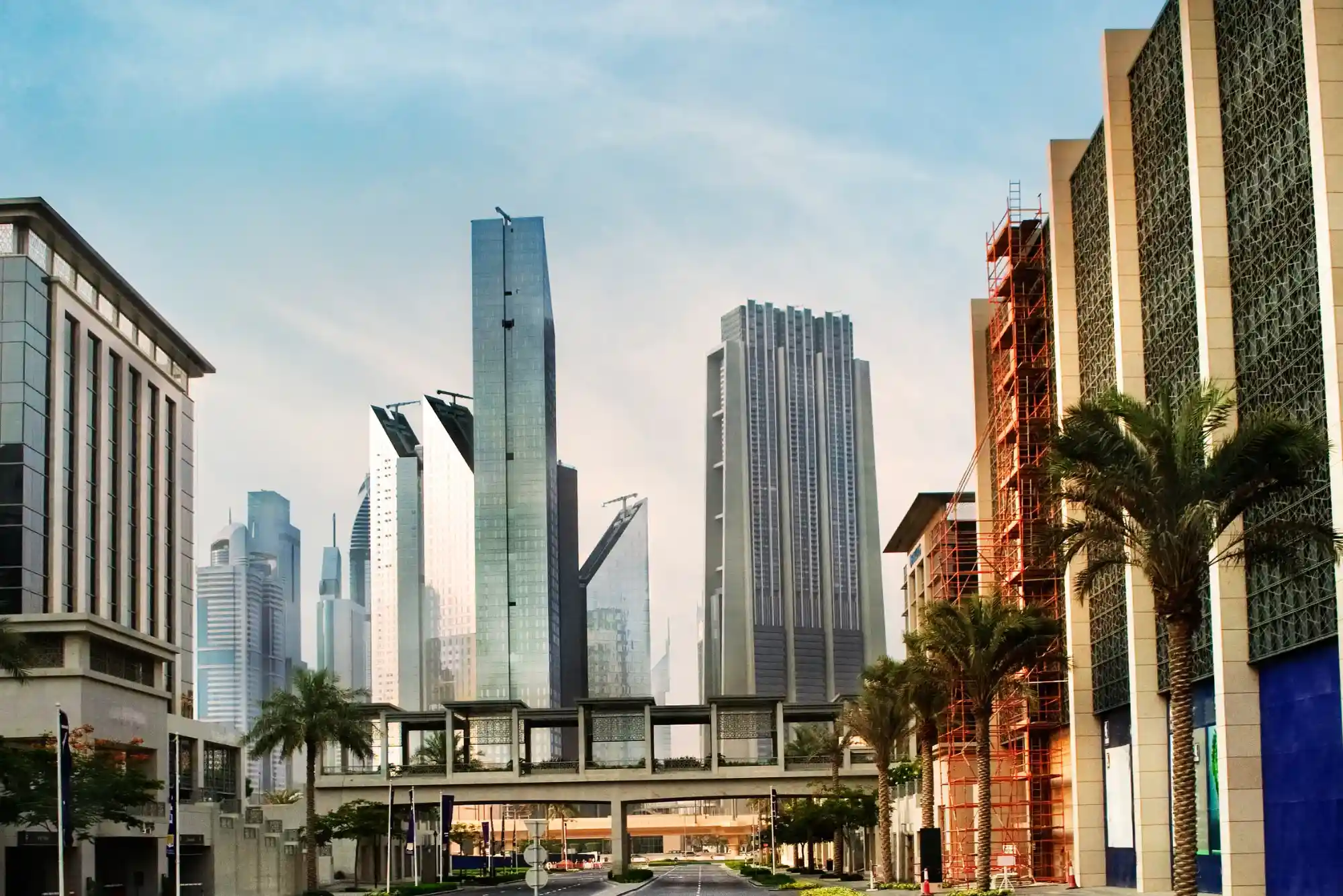The Dubai property market is soaring to new heights in 2025. Investors across the globe are capitalizing on the city’s explosive growth and favorable regulations. One standout opportunity is Trump Residences Dubai — a premium investment that combines luxury, location, and eligibility for long-term residency in the UAE.
Dubai’s real estate market has long been a bellwether for the city’s economic vibrancy – and as of 2025, it’s clear the sector is in the midst of another remarkable upswing. After navigating global challenges in the early 2020s, Dubai property has roared back with record-breaking transactions and surging investor interest. This section will delve into the current investment landscape: how the market performed in 2023-2024, what’s driving growth, the latest government incentives, and where new opportunities lie for investors. Whether you’re a seasoned property investor or a curious observer, understanding these trends will help you gauge where Dubai’s real estate is headed and how to capitalize on it.
Record Performance and Post-Pandemic Rebound
Dubai’s property market is shattering records. 2023 marked the highest real estate activity in Dubai’s history, with approximately 166,400 deals recorded, worth about $173 billion (AED 634 billion). This represented roughly a 17% surge in volume over the previous year, solidifying the city’s status as one of the world’s hottest realty markets. Importantly, this momentum didn’t fizzle out; it carried straight into 2024. By the end of 2024, total transactions climbed even further – official figures indicate around 226,000 real estate deals, a 36% increase in volume year-on-year. In short, Dubai is experiencing an unprecedented boom in property sales, from entry-level apartments to ultra-luxury penthouses.
Several factors underpinned this rebound:
- Post-pandemic Appeal: After global lockdowns, Dubai emerged early as an open, business-friendly hub. The city’s effective handling of the pandemic and swift reopening attracted entrepreneurs, remote workers, and high-net-worth individuals seeking a safe haven. Many decided to put down roots (and invest capital) in Dubai’s real estate.
- Inflow of High-Net-Worth Individuals: Dubai became a magnet for millionaires in 2022-2023, topping global charts for wealthy migrants. Investors from Europe, Asia, and especially Russia have poured money into Dubai properties as political and economic uncertainties elsewhere made the emirate’s stability and neutrality attractive. This influx of demand at the high end pushed up transaction volumes (2023 saw a record number of deals above AED 5 million and AED 10 million, with those segments up 50%+ from the prior year).
- Robust Economic Recovery: Dubai’s economy rebounded strongly, with Expo 2020’s success and a revival in tourism (Dubai welcomed over 17 million visitors in 2023). A booming economy increased consumer and investor confidence, spilling over into real estate purchases for both personal use and rental income.
Demand Drivers: Why Investors are Flocking to Dubai
What’s drawing investors in such numbers? A combination of strong returns and strategic government policies is at play. According to market analyses, Dubai’s real estate offers some of the best yields among global cities – average rental yields in desirable areas range around 7-8%, far outperforming cities like London or New York (where yields can be half that). At the same time, property values in Dubai have been on a steady uptrend. The year 2023 alone saw average residential prices jump by roughly 15-20% across the board, with certain villa communities and prime apartments experiencing even larger appreciation.
Another major draw is Dubai’s investor-friendly environment:
- Zero Tax on Property and Income: Dubai levies no annual property tax, no capital gains tax, and no personal income tax. This means investors keep all rental profits and any price appreciation – a significantly different proposition than many Western markets. (Note: a 5% VAT applies on some real estate transactions like commercial property and on broker services, but not on residential sales of new units.)
- Residency Visas for Investors: The government’s introduction of long-term visas has been a game-changer. Property buyers investing ≥ AED 2 million (~$545,000) qualify for a renewable 10-year Golden Visa, granting residency rights. There are also 5-year visas for smaller investments (≥ AED 750k). This policy has enticed many foreign investors – by investing in a Dubai home, they effectively secure a foothold in the country. Developers of luxury projects (for example, those behind Trump Tower Dubai) often highlight that purchasing certain units can come with Golden Visa eligibility, making the proposition even more attractive.
- Progressive Regulations: Over the past decade, authorities have implemented measures to ensure market stability – such as tighter oversight of off-plan sales via escrow accounts, mortgage caps to prevent over-leveraging, and transaction fees to disincentivize quick flipping. These rules have had a cooling effect on speculation and helped Dubai shed its “boom-bust” reputation. Today’s demand is driven more by genuine end-users and long-term investors, which makes the growth feel sustainable and grounded in real usage.
Furthermore, Dubai’s push into new economic sectors (technology, remote work, green energy) is bringing fresh professionals into the city, expanding the pool of renters and buyers. In 2024, the government rolled out initiatives like the Freelancer Permit and updated retirement visa options – each of which indirectly supports the real estate sector by increasing the population of expatriates who can live (and invest) in Dubai.
Emerging Trends: What’s Hot in 2025
Within the broader market, a few trends stand out in 2025:
- Off-Plan Sales Dominance: Off-plan properties (those sold before or during construction) are extremely popular again. Investors are eager to buy into new developments at launch prices, partly due to attractive payment plans (often 50-80% of the price is paid only upon completion). Developers have been launching projects at a rapid clip to meet demand. Notably, many off-plan buyers today are end-users or long-term investors, not just speculators, thanks to the regulatory changes. Projects by reputed developers in prime locations can sell out within days of launch. For instance, when Trump Residences Dubai opened sales for its units in late 2024, it garnered significant attention due to the project’s prestige and the relatively accessible entry point (prices starting around AED 1.7M for a luxury one-bedroom).
- Luxury and Branded Residences Boom: The high-end segment is on fire. Branded residences (think developments associated with names like Trump, Four Seasons, Armani, Missoni, etc.) are seeing intense demand from both international buyers and local elites. These projects often command a premium – yet they offer unique features, prime addresses, and the cachet of a global brand. In a market flush with wealthy investors, even ultra-luxury inventory (mansions on Jumeirah Bay Island, penthouses in the Burj Khalifa area) is being snapped up rapidly. This has led to record prices; in late 2023 a few marquee penthouses breached the AED 100 million mark. Investors eyeing this space should note the potential for high appreciation, as supply of truly top-tier properties remains relatively limited.
- Growth of Emerging Districts: While established areas (Downtown, Dubai Marina, Palm Jumeirah) remain perennially popular, savvy investors are also watching emerging locales. Developments around the new Dubai Harbour, Dubai Creek Harbour, and the Expo City site (District 2020) are drawing interest. These areas offer modern infrastructure and are positioned as the “next big thing,” sometimes with price points a notch below the well-known districts. As the city’s population grows (Dubai aims to hit 5.8 million residents by 2040, up from ~3.5 million now), these new districts present opportunities for early investors to ride the growth curve.
Another trend worth noting is the return of institutional investors. Real estate investment trusts (REITs) and private equity funds have been increasingly active in the UAE property market in the past two years, targeting commercial assets and also rental residential portfolios. Their involvement adds depth and maturity to the market, making it more robust.
Challenges and Risks to Monitor
No market is without challenges. For Dubai, the current outlook is very positive, but investors should still approach with informed caution:
- Interest Rates: Mortgage interest rates rose globally through 2022-2023 as central banks fought inflation. The UAE’s rates mirrored the U.S. Federal Reserve (due to the dirham’s dollar peg). Higher financing costs could eventually cool demand, especially among residents who rely on mortgages. So far, the impact has been muted because a large portion of transactions are cash deals, but a prolonged high-rate environment may temper price growth.
- Supply Wave: With so many new projects launching, there’s the question of whether supply might outstrip demand in certain segments. Analysts estimate tens of thousands of new units are slated for delivery in 2025-2026. If they concentrate in one category (say mid-range apartments), we might see rent or price growth soften in that segment. However, Dubai has historically managed to grow its population to absorb new supply, and projects are phased over years. The luxury segment, in particular, faces less risk of oversupply due to limited prime land and deliberate exclusivity.
- Global Economic Factors: Dubai is not immune to global economics. A recession in major source countries (like an economic slump in Europe or China) could temporarily slow foreign investment inflows. Geopolitical tensions can also have unpredictable effects on investor sentiment. That said, some past crises have actually benefited Dubai as a safe haven (capital fleeing instability elsewhere often landed in Dubai real estate, as seen during certain regional conflicts or currency crises).
The government’s proactive approach – such as adjusting visa rules or economic policy – has been a mitigating factor against many risks. For example, in response to rapid growth, authorities can calibrate regulations (they’ve done so before by raising transaction fees to deter flipping in 2013). Being mindful of these dynamics means investors should choose quality assets and have a reasonable investment horizon, rather than chasing only short-term gains.
Conclusion: Balancing Optimism with Prudence
Dubai’s real estate investment landscape in 2025 is characterized by high optimism, and largely for good reason. The city offers a unique mix of yield, growth, and lifestyle benefits that few other markets can match. Global investors are taking notice, and the influx of capital is visible in sky-high transaction numbers and ambitious new developments rising from the desert sands. As always, the key for any investor is to do due diligence: pick trustworthy developers, focus on locations with enduring demand, and ensure the investment aligns with your goals (be it rental income, long-term appreciation, or a future residence for yourself).
From affordable apartments on the city’s outskirts to branded luxury in Downtown, opportunities span the spectrum. If you’re eyeing a signature property that embodies many of the trends discussed – say, an apartment in Trump Tower Dubai which offers prime location, brand prestige, and promising ROI potential – make sure to evaluate how it fits into your portfolio. Often, the best investments are those that marry personal use and financial gain (a concept Dubai excels at, given you can enjoy a holiday home that also yields solid returns).
In summary, Dubai real estate in 2025 presents a landscape of robust growth and innovation, tempered by wiser oversight than in past booms. By staying informed on market trends and government policies, investors can confidently navigate this landscape. Whether you’re looking to diversify internationally or capitalize on Dubai’s rising trajectory, now is an exciting – and potentially rewarding – time to engage with this dynamic market.
For a deeper dive into Dubai’s real estate trends or guidance on selecting the right investment, don’t hesitate to reach out to our team of experts. And if you’re ready to explore current opportunities, visit Trump Tower Dubai to see how one of the city’s latest developments is capturing the essence of Dubai’s booming property scene. Your next high-return investment might just be on the Dubai skyline.





